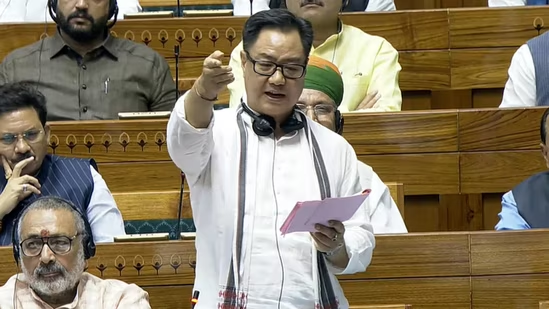Waqf Amendment Bill: Kiren Rijiju’s Statement and the Debate Ahead
The Waqf Amendment Bill is a significant legislative proposal that has garnered attention from various stakeholders in the Indian political landscape. This bill aims to address critical issues surrounding the management of waqf properties, which are religious endowments typically held for charitable purposes in Islam. Understanding the implications of this bill is crucial, not just for policymakers but also for the communities that depend on these properties for social and economic support.
The Waqf Amendment Bill is being introduced in Parliament today, and it is expected to be discussed and debated extensively. Union Minority Affairs Minister Kiren Rijiju has given a statement regarding this bill, in which he said that “some leaders and religious leaders are misleading innocent Muslims.” This assertion highlights the tension surrounding the bill, indicating that its introduction is not without controversy. Rijiju also claimed that certain opposition leaders privately support this bill but choose to oppose it publicly for political leverage. This duality raises questions about the true motivations behind the opposition and the potential consequences for Muslim communities if the bill is enacted.
It is essential to explore the historical context of waqf properties in India, which hold significant cultural and religious importance. These properties have traditionally provided financial support for mosques, schools, and hospitals, playing a crucial role in community development. As the government seeks to introduce reforms, it is vital to consider how these changes will impact the existing frameworks that support these properties.
Read all Information about Waqf Amendment Bill.


Objective of Waqf Amendment Bill
The Waqf Amendment Bill 2024 aims to improve the management and regulation of waqf properties. The bill will amend the Waqf Act 1995, which was initially established to govern the administration of waqf properties. A central goal of the amendment is to prevent the misuse of waqf properties and ensure transparency in their management. This is particularly important as reports of mismanagement and corruption have surfaced over the years, leading to calls for reform. By addressing these concerns, the government hopes to restore confidence among stakeholders, ensuring that waqf properties serve their intended purposes effectively.
The Waqf Amendment Bill 2024 aims to improve the management and regulation of waqf properties. The bill will amend the Waqf Act 1995, to prevent misuse of waqf properties and ensure transparency.
Opposition’s stand
Opposition parties have described the bill as “unconstitutional” and “an attack on the rights of minorities.” Congress and other opposition parties have shown solidarity to oppose this bill, arguing that it undermines the religious rights of minorities. They express concern that the new regulations may lead to increased government interference in waqf administration, which could compromise the autonomy of religious institutions. Furthermore, the opposition fears that the amendments may pave the way for the misappropriation of waqf properties under the guise of reform, potentially harming the communities that rely on these assets.
Opposition parties have described the bill as “unconstitutional” and “an attack on the rights of minorities.” Congress and other opposition parties have shown solidarity to oppose this bill. They say that this bill can affect the religious rights of minorities.
Government’s stand
In your opinion, will this bill help in improving the management of waqf properties, or will it adversely affect the rights of minorities? Share your thoughts with us. Engaging in this conversation is vital as the bill moves forward, and community voices need to be amplified in the legislative process. By sharing insights and perspectives, stakeholders can contribute to a more informed discussion that takes into account the diverse needs and concerns of all affected parties.
The government maintains that this bill is in the national interest, asserting that its aim is to ensure the proper use of waqf properties. Kiren Rijiju has emphasized that extensive deliberations and preparations have been conducted before bringing this bill forward. He argues that the proposed changes are necessary to enhance accountability and reduce instances of mismanagement. Rijiju has also suggested that those who oppose this bill are doing so for political reasons rather than genuine concern for minority rights, which adds another layer of complexity to the ongoing debate. The government’s commitment to reform is seen as an attempt to align waqf management with contemporary governance standards.
The government says that this bill is in the national interest and its aim is to ensure the proper use of Waqf properties. Kiren Rijiju said that extensive deliberations and preparations have been done before bringing this bill. He also said that those who are opposing this bill are doing it for political reasons.
Conclusion
Only after the debate and discussion on the Waqf Amendment Bill will it be clear in which direction this bill will go. The divergence in opinions among political parties reflects deeper societal divides regarding religious rights and governance. However, it is certain that there will be a heated debate in Parliament on this issue. The implications of this bill extend beyond technical amendments; they touch upon the core values of minority rights, religious autonomy, and responsible governance. As stakeholders engage in discussions, it will be crucial to keep the interests of the communities that rely on waqf properties at the forefront. Ultimately, the way forward will require a careful balance between reform and respect for religious freedoms.
Only after the debate and discussion on the Waqf Amendment Bill will it be clear in which direction this bill will go. But it is certain that there will be a heated debate in Parliament on this issue.
In your opinion, will this bill help in improving the management of Waqf properties, or will it affect the rights of minorities? Share your opinion with us.
